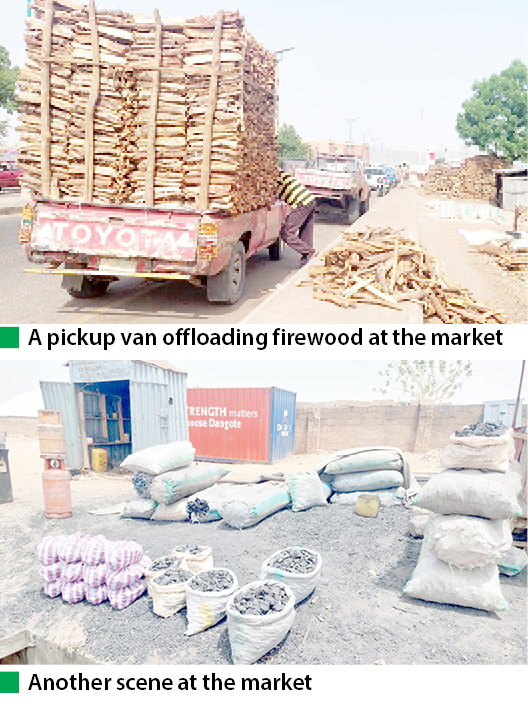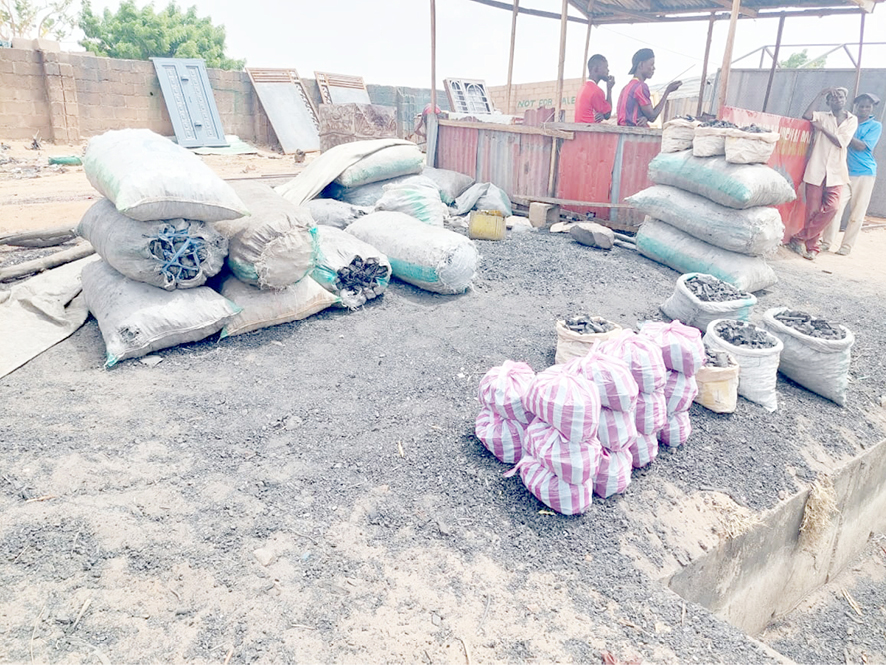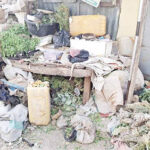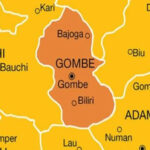Activities of firewood and charcoal merchants in Gombe State are fast depleting forest reserves and having negative impacts on the environment, our correspondent reports.
Gombe State is located within the Guinea Savannah and Sudan Savannah belts in the northeastern part of Nigeria; hence, like other states, Gombe is known as Jewel in the Savannah.
But despite being located in the savannah, there are forest reserves surrounding the state, which preserve the environment, provide shelter for residents, as well as protect the state from erosion and other forms of environmental degradation.
But over the years, charcoal merchants and firewood sellers have been depleting the forest reserves by indiscriminately cutting down trees to provide energy for the booming population of the state.
- Cut down cost of governance, AfDB President charges Tinubu
- FrieslandCampina unveils Nigeria’s first high yield crossbreeds
Daily Trust on Sunday gathered that tree felling to produce firewood has been going on unchallenged for over five decades, exposing the state to negative effects of climate change.
When our correspondent visited the oldest firewood market in the state, located along Dukku road in Gombe metropolis, the secretary of the Gombe State Firewood Sellers Association, Usman Muhammad, said the business had spanned over 50 years.
He said they inherited the business from their fore-parents, who started by bringing firewood on their donkeys from various farms.
“With time, people started bringing firewood on lorries to different markets in Gombe metropolis. From few trucks, people started trooping to the market. Apart from firewood sellers, other businessmen started bringing their commercial trucks to convey firewood from the forests.
“Presently, the firewood is being ferried on pickup vans, to the point that we now have hundreds of them scattered across the state. Almost in every village you would find pickup vans meant to transport firewood from the forest to Gombe metropolis and other locations,” he said.
Investigation revealed that most of the forests surrounding Gombe metropolis were totally cut down and firewood sellers now go to other places like Dukku, Kwami and Funakaye local government areas, as well as the neighbouring Bauchi and Borno states.
The secretary of the firewood sellers told Daily Trust on Sunday that forests in the state could not serve the needs of the state; hence they have to travel to neighbouring states to get firewood.
“We have exhausted the forests near Gombe, so we presently get firewood from Dukku, Kwami and Funakaye local government areas, where there are thick forests,” he added.

Hundreds of trucks supply firewood, charcoal
It was gathered that in Gombe market alone, over 100 trucks and pickup vans bring firewood on a daily basis.
According to players in the charcoal and firewood business, a pickup van carries firewood worth N50,000, while bigger trucks carry loads of much more than that.
A resident of Malleri village of Kwami Local Government Area, Sani Musa said, “Most of us engage in fulltime farming as our only means of livelihood, but what we harvest may not be enough to feed our families in the whole year. So we usually go to the forest after harvest and cut down trees to sell in order to supplement our little income from the sale of our farm produce before the next rainy season.”
Multiple taxation
Despite the environmental challenges posed by the activities of charcoal and firewood merchants, it was gathered that the state government makes fortune through revenue generation.
The firewood sellers said they paid revenue to each local government area where they get the product.
“On each vehicle that brings firewood or charcoal into the state, we pay revenue to both the state and respective local governments where we fetch firewood.
“We pay N300 as revenue for each vehicle to the local government where we fetch the firewood, N5,000 to Gombe Local Government, where our market is located, and N500 to the state government. Another revenue was introduced recently and we were asked to purchase stickers at N4000, which is to be renewed annually,” Muhammad, the secretary of the firewood sellers said, lamenting that although they paid regularly, they still lacked a permanent market to conduct their businesses.
“Our major challenge is lack of a permanent market to conduct our business. Over the years, we are being moved from one place to another, and it is negatively affecting our business.
How business provides employment opportunities
Although the activities of firewood and charcoal sellers have put the environment at risk, Daily Trust on Sunday gathered that it provides employment opportunities to 20,000 people across the state.
“There are over 5,000 registered members of the association from the 11 local government areas of the state. Apart from them, thousands of others are indirectly employed. Even married women are in the business with very little capital.
“The coming of charcoal as source of energy for cooking has complemented the firewood business. The population is always growing and firewood alone cannot cater for the high demand of alternative energy sources for domestic usage,” Muhammad said.
Iliyasu Musa, 25, a resident of Tumfure in the outskirts of Gombe metropolis, said charcoal selling was his only means of livelihood.
“There are different varieties of charcoal. Some are made from African birch (marke), tamarind (tsamiya) and neem.
“The one made from African birch is the most qualitative and the most expensive. Customers prefer it as it lasts longer during cooking. It is also costlier than other varieties,” he said.
Since migrating from his village to Gombe five years ago, Musa has been supporting his aged parents through charcoal business.
“The business has been booming for the past two years since the price of gas escalated. Before the rise in cooking gas price, a bag of charcoal was between N1,500 and N2,000, but now, it is sold at N3,000 and above,” he added.
According to him, during the dry season it is easier to get charcoal, unlike during the rainy season, “when it is very difficult because of farm activities.”
Musa said that both the high, middle and low-income earners patronised them.
He said, “We have different kinds of people buying from us. Some buy a whole sack, others half or even quarter. And there are those that buy as little as N100 or N200.
“We paid N200 every month to revenue officials.”
Also, before pickup vans can enter the town, they pay revenue at the entry point before having access to their goods without hindrance.
Musa, however, lamented that their major challenge was threat by the government to ban the business, saying, “We don’t know any other business.”
On his part, Muhammad Umar (Mai Kayan Miya), has been selling charcoal and firewood for the past 10 years at his stall along the Gombe-Bauchi road, near Orji Quarters.
“I was selling firewood before I turned to charcoal because people now prefer charcoal because it is cheaper and easier to use than firewood, especially during the rainy season.
“I sell about 40 bags of charcoal every month. We are into both wholesale and retail. The price ranges from N2,500 to N3,000. Sometimes the tree the charcoal is produced from, like iron wood, (kirya) determines the price of the charcoal.
Our correspondent reports that the state government once banned the sale of charcoal, but when elections came, it was suspended, apparently to get votes.
While Umar Mai Kayan Miya agreed that the charcoal business is harming the environment, he said, “The masses cannot afford to buy gas for use in their houses.
“To protect the environment, our association has been advocating tree planting to replace those that were cut down.”
He, therefore, called on the government to sensitise people and reduce the price of gas to reduce environmental challenges, adding, “They should also provide seedlings to plant more trees.
“Government should reduce the price of kerosene for rural dwellers and price of gas for urban dwellers. If these can be done, people on their own will stop using firewood and charcoal.”
Gov’t to provide alternative energy sources
When contacted, Ismaila Uba Misilli, the director-general, Press Affairs to Governor Muhammadu Inuwa Yahaya, said the state government was working to arrest the situation.
According to him, the state government is creating awareness by sensitising the populace to be conscious of their environment.
He said, “We have established community woodlots to reduce pressure on our forests, use forest guards for protection and encourage people’s participation in private and community plantations.
“Governor Yahaya has established the Gombe Goes Green (3G) project with the main objective of planting one million trees each year through different models of planting and offering protection to our existing forest.”
Misilli added that the state government is going the extra mile to see the possibility of having sustainable sources of alternative energy, “especially with the present challenge of global warming, keeping in mind the menace of drought, desertification and flood in the state.”
He said there was a plan for provision of an improved cooking stove for distribution to residents for free and procurement of gas cylinders to be sold at a subsidised rate.

 Join Daily Trust WhatsApp Community For Quick Access To News and Happenings Around You.
Join Daily Trust WhatsApp Community For Quick Access To News and Happenings Around You.

